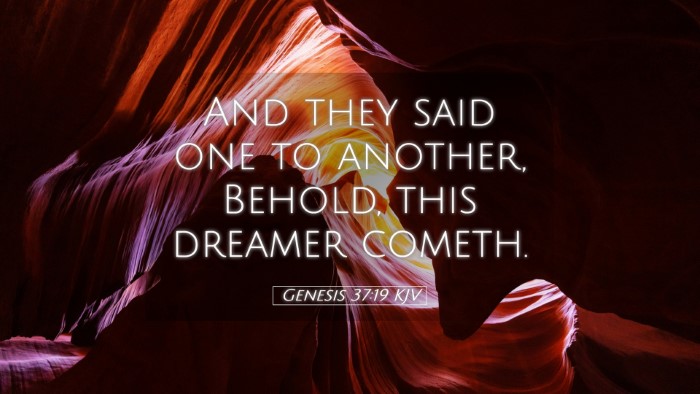Commentary on Genesis 37:19
Genesis 37:19 (KJV): "And they said one to another, Behold, this dreamer cometh."
Introduction
The verse presents a critical moment in the narrative of Joseph, the favored son of Jacob. As Joseph approaches his brothers, they recognize him as the "dreamer," a label that carries both awe and contempt. This commentary draws insights from esteemed public domain scholars such as Matthew Henry, Albert Barnes, and Adam Clarke, providing a comprehensive analysis of the text.
Contextual Background
- Joseph’s Dreams: Earlier in Genesis, Joseph receives two dreams that predict his future supremacy over his family. These dreams stoke the jealousy of his brothers.
- Family Dynamics: Joseph is the favorite son of Jacob, as indicated by his father's gift of a richly ornamented robe. This favoritism exacerbates the existing tensions among the brothers.
- Setting the Scene: The passage occurs when Joseph is sent by Jacob to check on his brothers who are pasturing the flocks. His arrival triggers hostile reactions among the brothers.
The Label of "Dreamer"
In calling Joseph a "dreamer," the brothers reveal much about their own thoughts and emotions:
- Mockery and Resentment: The title is laced with sarcasm; it reflects their disdain for Joseph’s aspirations and the dreams he has shared that elevate him above them.
- Recognition of Significance: Even in their resentment, the brothers acknowledge the potential reality of Joseph's dreams, suggesting a deeper fear of what those dreams might mean for their own status.
Matthew Henry's Perspective
Matthew Henry emphasizes several key aspects in his commentary on Genesis 37:19:
- The Brothers' Conspiracy: Henry notes that this moment is not just about a verbal jab; it's the precursor to their conspiracy against Joseph. Their label for him is the spark that ignites deeper treachery.
- Divine Providence: Despite the negative insinuation of the term, Henry asserts that God's providence is at work. The brothers unknowingly set in motion events that lead to Joseph’s eventual rise in Egypt and the preservation of Jacob's family.
Albert Barnes' Insights
Albert Barnes provides a nuanced exploration of the socio-psychological dynamics at play:
- Sibling Rivalry: Barnes highlights that the brothers' animosity is rooted in the natural rivalry that exists within families. The term "dreamer" embodies their collective jealousy.
- The Role of Dreams: He remarks on the cultural importance of dreams in the context of ancient Israel. Dreams were often seen as prophetic, which may have only intensified the brothers’ fears regarding Joseph.
- Foreshadowing: The way the brothers refer to Joseph sets the stage for the dramatic events that follow, illustrating the profound impact of their decision-making.
Adam Clarke's Commentary
Adam Clarke's insights offer a deeper look at the character of Joseph and the implications of this incident:
- Character Analysis of Joseph: Clarke points out that Joseph’s innocence is juxtaposed against the malice of his brothers. Joseph’s "dreamer" status marks him not just as a target of jealousy but as a figure deeply connected to God’s unfolding plan.
- Moral Lessons: Clarke encourages readers to reflect on the ethical implications of jealousy and betrayal. This moment serves as a cautionary tale about the destructive nature of envy.
Theological Themes
This verse serves as a microcosm of larger theological themes that permeate the scriptures:
- The Sovereignty of God: Even in the face of human betrayal, God's sovereign hand guides the trajectory of history, as seen later in Joseph’s life.
- Jealousy and Envy: The brothers' behavior manifests the destructive potential of jealousy. Such emotions are not merely personal but have far-reaching consequences.
- The Providence of God: The eventual reconciliation between Joseph and his family shows that God can bring good out of evil intentions.
Conclusion
Genesis 37:19 encapsulates a turning point in the story of Joseph, establishing a backdrop of familial tension and prophetic destiny. The commentary provided by Henry, Barnes, and Clarke sheds light on the psychological, relational, and theological dimensions of this pivotal moment.
For pastors, students, and theologians, this verse serves not only as an educational tool but as a guide to understanding the complexities of divine purpose against the backdrop of human frailty. It invites a deeper reflection on the nature of our actions in light of God's overarching plan.


